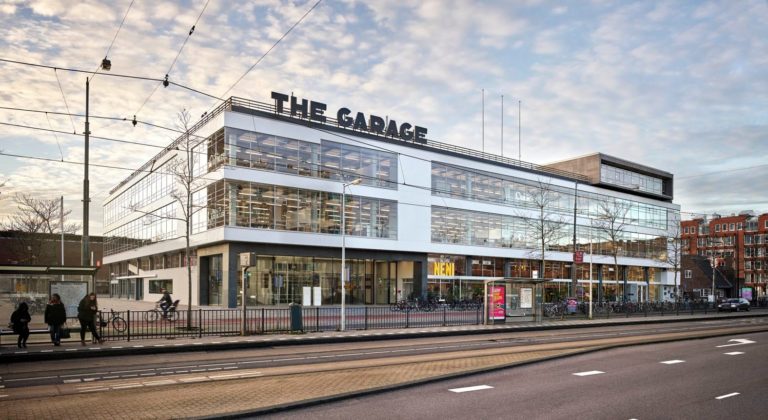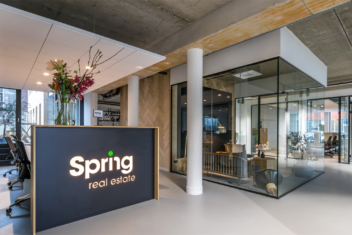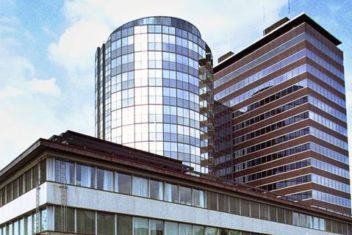What’s it like to work at: Parcom Capital?

————–ENGLISH FOLLOWS AFTER DUTCH————————-
Vandaag spreken wij Wietske van der Kamp (28). Na haar master heeft Wietske twee jaar bij Bain & Company gewerkt, waarna zij besloot om te gaan werken bij Parcom Capital, een investeringsmaatschappij (private equity). Benieuwd naar deze interessante switch? Lees dan hieronder het hele verhaal!

Wilde je al langer in private equity werken?
Vanaf het moment dat ik met private equity in aanraking kwam, was ik snel verkocht, maar als je mij drie jaar geleden had gevraagd of ik bij een investeringsmaatschappij zou gaan werken, dan had ik dat niet verwacht. Dat vind ik het mooie aan het leven, soms moet je jezelf laten verrassen.
Laten we even teruggaan in de tijd; naar je studie.
Mijn afgeronde studies hebben toevallig hele hippe namen. Bachelor: Future Planet Studies. Master: stroming binnen Natuurkunde genaamd Science, Business & Innovation. Bij ‘Future Planet Studies’ denken mensen weleens dat je bezig bent met nieuwe planeten. In realiteit ben je bezig met deze aarde van nu en in de toekomst, denk aan klimaatproblemen en voedselproblemen. De master ‘Science, Business & Innovation” is een combinatie van natuurwetenschappen met bedrijfs- en sociale wetenschappen waarbij je alle drie de vormen gebruikt om o.a. businessplannen uit te rollen, bijvoorbeeld binnen duurzame energie. Het mooie aan deze master is de multidisciplinaire aard.
Hoe kwam je vanuit deze studies bij Bain & Company terecht?
Ik ben zeker niet iemand die al jaren van tevoren wist dat ik strategie consultant wilde worden. Door het plezier in het schrijven van mijn scriptie over duurzaamheid en technologie, wilde ik in eerste instantie bij mijn stagebedrijf werken. Echter kwam ik er al snel achter dat ik mijzelf niet al zo jong wilde beperken tot dat “hokje”. Ik heb besloten een stapje breder te beginnen om mijzelf te kunnen oriënteren. Vandaar dat ik ben begonnen als strategie consultant bij Bain & Company, om later een weloverwogen keuze over mijn carrière te kunnen maken. Ondanks mijn waanzinnige tijd bij Bain, zit ik nu in een totaal andere sector, in private equity. Breder beginnen was dus een top keuze voor mij.
Hoe verliep jouw sollicitatie proces?
Voor mijn sollicitatie bij Bain & Company heb ik om te starten meerdere case boeken bestudeerd. Op de FSA Consultancy Club Facebook is er een bundel met caseboeken die je kunt downloaden om cases te oefenen. Via diezelfde pagina heb ik mensen gevonden om cases mee te oefenen. Wat ik zo handig vond aan cases oefenen met vreemden is dat je echt indruk moet maken, net als tijdens een echte sollicitatie. Je moet hen meenemen in je verhaal en komt niet weg met fouten. Door zelf cases te oefenen, leer je de content; en door met anderen te oefenen krijg je je verbale en non-verbale communicatie goed op orde. Fun fact: degene met wie ik samen de cases heb geoefend via de FSA Consultancy Club Facebook is tegelijkertijd met mij aangenomen bij Bain. Dus met mijn practice buddy, stond ik vervolgens op de vrijmibo en gingen we samen naar een trainingsweek in Amerika. Erg gaaf!
Bij Parcom had ik al vaker contact gehad met een van de Investment Managers en was ik op één van hun netwerk borrels geweest (we hebben een waanzinnig dakterras). Ik vond Parcom vanaf de start al een mooi bedrijf, dus het was voor mij geen lastige beslissing om dit verder te onderzoeken. Omdat je in een kleiner team komt te werken, is het van belang dat de ‘fit’ optimaal is. Vooraf heb ik bij Parcom met bijna iedereen uit het investment team gesproken tijdens koffietjes en zes interviews. De interviews bestonden uit het testen van mijn motivatie en basic ‘business sense’; tot het volledig uitwerken van cases en het bouwen van een LBO (Leveraged Buy Out) model. Het uitwerken van cases is mijn ‘second nature’ geworden door mijn tijd bij Bain, maar ik heb in de weekenden moeten doorwerken om ook het financiële gedeelte op orde te krijgen.
Waarom heb je de switch gemaakt van consultancy naar private equity?
Ik ben bij Bain begonnen in het private equity team (c.a. 8 maanden) en ik vond het fantastisch. Je pluist in een hele korte tijd een heel bedrijf uit en je kijkt o.a. naar de markt, de competitie, de klanten, het product, de service, de groeimogelijkheden, et cetera. Mijn ambitie voor private equity is toen ontstaan en na 2 jaar heb ik besloten om die stap te maken. Het grote verschil tussen strategie consulting en private equity is dat je bij consulting voor een klant werkt en binnen private equity zelf meer aan de knoppen kan draaien.
Waarom koos jij voor Parcom?
Binnen het segment waarbinnen ik op zoek was, zijn de teams vaak wat kleiner. Elk kantoor heeft zijn eigen stijl en daarbij passen mensen met een specifiek karakter. Parcom heeft een heel sterk team, is heel open, menselijk en we nemen onszelf niet te serieus. Als we aan het werk zijn, halen we het onderste uit de kan, maar daarnaast vinden we het net zo belangrijk om een leuke tijd te hebben en als het kan lekker te genieten. Iedereen is heel direct en levert feedback on the spot, waardoor we efficiënt te werk kunnen gaan. Mijn collega’s zijn ambitieus, slim en behulpzaam, waardoor we mooie prestaties kunnen leveren – tegelijkertijd zijn het ook de mensen met wie ik aan het einde van de dag een biertje wil drinken, en dat is geweldig!
Wat doe je precies als Associate in private equity?
Om het kort uit te leggen; je houdt je vooral bezig met twee stromen. De eerste bestaat uit het managen van de huidige portfolio bedrijven, dat zijn dus succesvolle deals die al gedaan zijn. Binnen die bedrijven zijn wij groot aandeelhouder en zo’n bedrijf krijgt later (vaak na 5 jaar) weer een nieuwe eigenaar. In de tussentijd werk je samen met het management van die bedrijven aan de grote strategische vraagstukken. De tweede stroom bestaat uit de nieuwe deals, die het portfolio kunnen aanvullen. Binnen een deal kijk je naar verschillende aspecten in een zogeheten “Due Dilligence” – dit moet je zien als een onderzoek welke moet bepalen of wij het bedrijf interessant vinden, waarvan de drie meest voorkomende onderdelen commercieel, juridisch en financieel zijn. Hierbij kunnen externe adviseurs je bijstaan. Voor het commerciële deel zou bijvoorbeeld Bain kunnen helpen. Nadat alle informatie is verzameld en conclusies zijn getrokken, wordt samen met het team besloten of dit een potentiële nieuwe aanwinst zou kunnen zijn voor ons portfolio. Door deze verschillende werkzaamheden verschilt je day-to-day business, wat het dynamisch maakt.
Wat vind je het leukst aan je werk?
Ik vind het heel gaaf dat je in een korte periode, dan hebben we het over weken, veel informatie krijgt en een bedrijf door en door gaat begrijpen. Met elke deal wordt je business sense sterker. Je leert hoe bedrijven werken en weet steeds sneller wat een interessante deal is en wat niet. Daarnaast werk je met slimme en interessante mensen, zowel binnen Parcom als binnen het management van de portfolio bedrijven.
Wat vind je minder leuk, of lastig?
Lastig te zeggen, aangezien ik net ben gestart. Er is één ding wat ik soms lastig vind en dat is zeker een verschil is tussen consultancy en Private Equity. Als consultant stort je je 100% op één case. Binnen PE kan je tegelijkertijd betrokken zijn bij meerdere portfolio bedrijven en ook nog deals ernaast doen. Je moet snel schakelen van het ene naar het andere bedrijf, van de ene naar de andere deal, waarbij je in de meetings precies moet weten wat er bij elk van de bedrijven speelt. Dat is aan het begin even schakelen, en dat leer ik nu.
Heb je nog tips voor mensen die gaan solliciteren in consultancy of private equity?
Allereerst, neem je tijd. Je moet jezelf vooral niet opleggen dat je binnen de kortste keren een baan moet hebben. Het is niet erg om pas een half jaar later een baan te hebben, als dat jouw droombaan is. Die paar maanden extra voorbereiden is niks, in vergelijking met de 40 jaar die je nog moet gaan werken. Ook kunnen stages heel relevant zijn, vooral als je het nog niet zo goed weet. Het is een mogelijkheid om een bedrijf te leren kennen en veel kennis op te doen. Daarnaast, maak connecties met mensen binnen de bedrijven die jou interessant lijken. Probeer van te voren alvast een koffietje te doen of een belletje in te plannen. Dat vinden ze alleen maar leuk en dan heb je straks meerdere aanknopingspunten bij je sollicitatie. Het kan ook helpen om ook bedrijven te solliciteren waar je wil rondkijken, ook al is het niet je nummer 1 keuze. Wellicht past het toch bij je, en het helpt ook om het solliciteren te oefenen. Voor strategy consultant sollicitaties heb je naast je motivatie, ook de cases: de case goed uitvoeren en aan de andere kant de verbale en non-verbale communicatie on point krijgen is hierbij een must. Tip: interactie is echt belangrijk tijdens het oplossen van een case.
Ik raad iedereen aan om mee te doen aan een FSA-evenement, zowel studenten als bedrijven; je leert enorm veel van elkaar op een hele gezellige, informele manier. Ik heb laatst meegedaan aan de FSA Private Equity Cycle. Dat was een ontzettend leuk en creatief bedacht, online evenement. Na een cocktail workshop gingen we in break-out rooms onder het genot van een cocktail met studenten netwerken. Bij zo’n soort evenement is er laatst een stagiair aangenomen!
————–ENGLISH TRANSLATION————————-
Today we interview Wietske van der Kamp (28). After obtaining her Master’s degree, Wietske worked at Bain & Company for two years, after which she decided to switch jobs to work at Parcom Capital, an investment company (private equity). Curious about this interesting switch? Read the whole story below!
When did you decide you wanted to work for an investment company?
From the moment I came into contact with private equity, I was quickly convinced that I wanted to work in this industry. However, if you would have asked me three years ago whether I was going to work for an investment company, I would not have expected that. Life is full of surprises!
Let’s go back in time for a moment; to your studies.
The studies I have done happen to have very trendy names. Bachelor: Future Planet Studies. Master: track within Physics called Science, Business & Innovation. With “Future Planet Studies”, people sometimes think that you are studying new planets. In reality, you are dealing with our earth of the present and the future: think of climate and food problems. The master “Science, Business & Innovation” is a combination of science, business and social sciences. In this Master’s you use all three disciplines to, among others, roll out business plans, for example, within sustainable energy. The great thing about this Master’s is its multidisciplinary nature.
How did you end up at Bain & Company after your studies?
I am certainly not someone who had already known for years that I wanted to become a strategy consultant. Since I enjoyed writing my thesis about the combined topics of sustainability and technology, I initially wanted to work at my internship company. However, I soon realized that I did not want to limit myself at a young age to that “box”. I decided to take a step back to orient myself. That is why I started as a strategy consultant at Bain & Company; to be able to make a well-considered choice for my further career. Despite my amazing time at Bain, I am now in a different sector, in private equity. So starting my career from a broader perspective was a great choice for me.
How did your application process go?
For my application at Bain & Company, I studied several case books. On the FSA Consultancy Club Facebook, there is a bundle of case books that you can download to practice cases. On the same page, I found several people to practice cases with. What I found useful about practicing cases with strangers is that you also make a first impression, just as during a real job application. You have to guide them through your story and you won’t get away with mistakes. By practicing cases by yourself, you learn the content; and by practicing with others, you practice your verbal and non-verbal communication. Fun fact: The person I practiced cases with via the FSA Consultancy Club Facebook was hired at Bain at the same time. So my practice buddy and I were having Friday drinks together and we went to a trainings week in America. Very cool!
At Parcom I had been in contact with one of the Investment Managers and I was present at one of their network events (we have an amazing roof terrace). I thought Parcom was a great company from the start, so it was not a difficult decision for me to further examine this. As you will be working in a smaller team, it is important to have an optimal “fit”. Beforehand, I spoke to almost everyone from the investment team at Parcom over coffees and six interviews. During the interviews, my motivation and “business sense” were tested; I had to work on cases and I had to build an LBO (Leveraged Buy Out) model. Solving cases has become my second nature due to my experience at Bain, in order to also get the financial part well, I had to work in the weekends.
Why did you switch from consultancy to private equity?
When I started at Bain, I began on the private equity team for 8 months and I loved it. You research an entire company in a very short period of time. You investigate the market, competition, customers, product, service, growth opportunities, and more. My ambition for private equity arose at that time, and after two years I decided to take that step. The big difference between strategy consulting and private equity is that in consulting you work for a client and in private equity you are more in control.
Why did you choose Parcom?
Within the segment I was searching, the teams are often a bit smaller. Each office has its own style, so specific personalities fit well. Parcom has a very strong team, is very open, personal and we don’t take ourselves too seriously. When we are at work, we work as well as possible. However, we also think it is just as important to have a good time and enjoy whenever it is possible. Everyone is very straightforward and provides feedback on the spot, which enables us to work very efficiently. My colleagues are ambitious, smart and helpful, which allows us to deliver great work – at the same time, they are also the people I want to have a beer with at the end of the day, which is great!
What exactly do you do as an associate in private equity?
To explain briefly; you are mainly concerned with two aspects. The first aspect consists of managing the current portfolio companies, which are successful deals that have already been done. Within those companies, we are often a major shareholder and such a company will in the future (after approximately 5 years) get a new owner. In the meantime, you work with the management of those companies on larger strategic questions. The second aspect consists of the new deals, which can complement the portfolio. Within a deal you look at different aspects in a so-called “Due Diligence” – see this as an investigation that determines whether we find the company interesting – of which the three most common parts are commercial, legal and financial. External advisers can assist you with this. For the commercial part, for example, Bain & Company could help. After all the information has been gathered and conclusions have been drawn, a decision is made with the team whether this could be a potential new addition to our portfolio. These different activities allow for a varying day-to-day business, which makes it dynamic.
What do you like the most about your job?
I think it’s really cool that in a short period of time, we’re talking weeks, you get a lot of information and come to fully understand a company. With every deal your business sense becomes better. You quickly learn how companies work, and what is an interesting deal and what is not. You also work with smart and interesting people, both within Parcom and within the management of the portfolio companies.
What do you find less fun or difficult?
Difficult to say, since I just started. There is one thing I sometimes find difficult and that is for sure a difference between consultancy and private equity. As a consultant, you are 100% allocated to one case; while within PE, you can be involved in multiple portfolio companies at the same time and in the meantime do deals as well. You have to switch quickly from one company to another, from one deal to another, and you need to know exactly what is going on within each of the companies. That is difficult in the beginning, but I’m getting used to that now.
Do you have any advice for people who are going to apply for a job in consultancy or private equity?
First of all, take your time. Above all, you shouldn’t force yourself to have a job as soon as possible. It is okay to have a job six months later, if that is your dream job. Preparing those few extra months is nothing, compared to the 40 years that you still have to work. Internships can also be very relevant, especially if you don’t know yet where you want to work. It is an opportunity to get to know a company and gain a lot of knowledge. In addition, you will make connections with people within the companies that seem interesting to you. Try to schedule a coffee or call. I can assure you that most people like that and it enables you to have multiple starting points when you are applying. It can also help to apply for companies that are not directly your number 1 choice. Perhaps it suits you anyway, and it also helps to practice applying for a job. For strategy consultant applications, in addition to your motivation, you also have the cases. For this, executing the case properly, as well as getting the verbal and non-verbal communication on point, is a must. Tip: interaction is really important when solving the case.
I recommend everyone to participate in an FSA event. Both students and companies can learn a lot in a very pleasant, informal way. I recently participated in an FSA Private Equity Cycle event. That was a very fun and creatively organized online event. After a cocktail workshop, we went into break-out rooms to talk with students while enjoying a cocktail. After one of these events, we recently hired an intern!


